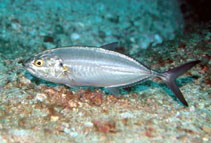| Family: |
Carangidae (Jacks and pompanos), subfamily: Caranginae |
| Max. size: |
55 cm FL (male/unsexed); max.weight: 2,810.0 g; max. reported age: 8 years |
| Environment: |
pelagic-neritic; brackish; marine; depth range 3 - 100 m |
| Distribution: |
Eastern Pacific: Santa Cruz Island, California, USA to Peru, including the Gulf of California and the Galapagos Islands. |
| Diagnosis: |
Dorsal soft rays (total): 18-21; Anal spines: 3-3; Vertebrae: 25-25 |
| Biology: |
Adults are found on the continental shelf, generally near the coast but also in deeper waters; penetrated estuaries (Ref. 9283). They feed mainly on silver-colored fishes, but also take squids, shrimps and other invertebrates (Ref. 9283). Juveniles are often found in estuarine waters (Ref. 9283). Marketed fresh, salted or dried, and smoked; also utilized as fishmeal and source of oil (Ref. 9283). |
| IUCN Red List Status: |
Least Concern (LC); Date assessed: 30 April 2008 Ref. (130435)
|
| Threat to humans: |
harmless |
Source and more info: www.fishbase.org. For personal, classroom, and other internal use only. Not for publication.
